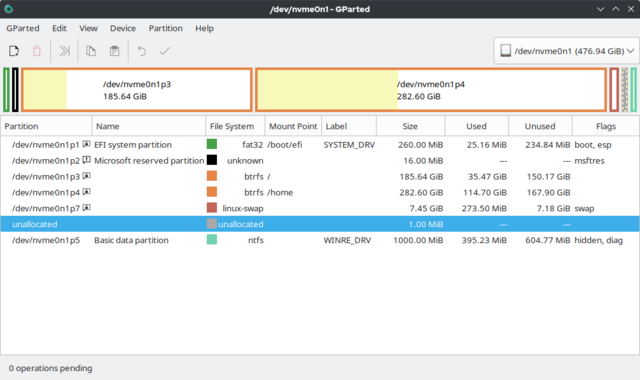GNU Parted
Open-source partition editor From Wikipedia, the free encyclopedia
GNU Parted (from GNU partition editor) is a free partition editor, used for creating and deleting partitions. This is useful for creating space for new operating systems, reorganising hard disk usage, copying data between hard disks, and disk imaging. It was written by Andrew Clausen and Lennert Buytenhek.
 The parted command | |
| Original author(s) | Andrew Clausen, Lennert Buytenhek |
|---|---|
| Developer(s) | Various |
| Stable release | |
| Repository | GNU Parted Repository |
| Written in | C |
| Operating system | Linux, GNU Hurd |
| Type | Partition editor |
| License | GPL-3.0-or-later |
| Website | www |
It consists of a library, libparted, and a command-line front-end, parted, that also serves as a reference implementation.
Currently[update], GNU Parted runs only under Linux and GNU/Hurd.[2]
Other front-ends
Summarize
Perspective
Text-based

nparted is the newt-based frontend to GNU Parted.[3]
Projects have started for an ncurses frontend,[4] that also could be used in Windows (with GNUWin32 Ncurses).[5]
fatresize offers a command-line interface for FAT16/FAT32 non-destructive resize and uses the GNU Parted library.[6]
Graphical front-ends
GParted is a graphical program using the parted libraries. It is adapted for GNOME, one of the two major desktop environments (the other being KDE) for Unix-like installations. It is often included as utility on many live CD distributions to make partitioning easier.
KDE Partition Manager is a Qt graphical program, also included on many live CD distributions, which made use of parted libraries; anyway, in version 4.0 its backend, KPMcore, was ported away from libparted to sfdisk.[8] QtParted was another graphical front-end based on Qt that is no longer being actively maintained.
Pyparted[9] (also called python-parted)[10] is the Python front-end for GNU Parted.
Linux distributions that come with parted by default include Slackware, Knoppix, sidux, SystemRescueCD, and Parted Magic.
Limitations
Parted previously had support for operating on filesystems within partitions (creating, moving, resizing, copying). This support was removed in version 3.0.[11]
See also
References
External links
Wikiwand - on
Seamless Wikipedia browsing. On steroids.